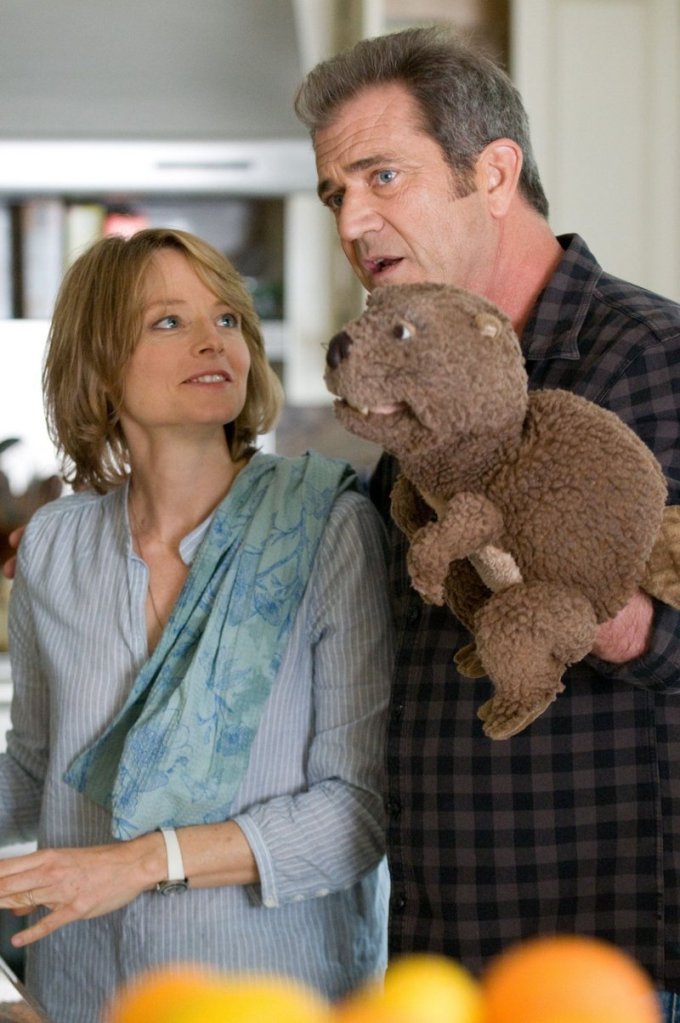You’ve never seen a Mel Gibson quite like this.
Distraught, depressed and suicidal, yes. He’s been fond of that MO over the decades, sticking a gun in his mouth, wracked by guilt over this, persecuted over that.
But in Jodie Foster’s film “The Beaver,” based on a much-praised Kyle Killen script, Gibson goes further off his rocker than we’ve ever seen him. And it’s a little unsettling.
Walter (Gibson) inherited his dad’s toy company, married a lovely woman (Jodie Foster) and has two handsome sons and a nice, big home.
But for some reason, he’s fallen into the very depths of despair.
Shrinks haven’t helped, nor have pills. When we meet him, our gruff, Aussie-accented narrator tells us, “It’s as if he’s dead and hasn’t had the good sense to take his body with him.”
He tries suicide. He’s kicked out of his house because of what he’s doing to his family.
But when he’s unloading some of the debris from his life into a dumpster, he fixates on one item — a hand puppet of a beaver. Next thing you know, Walter’s taking advice from the puppet, whose voice is Walter’s own, given that gruff accent we’ve heard as our narrator.
“I’m the only one what knows ‘ow you really feel,” the Beaver tells him. “Quite an obituary you’re writing for yourself, Walter.”
The Beaver becomes Walter’s therapy and his alter ego.
He hands people a card, explaining the beaver’s therapeutic value, and everybody just plays along. Walter disappears and the Beaver takes over, talking (Walter’s lips move — he’s not a ventriloquist) and correcting some of the things he’s done wrong in his life.
Walter suddenly has time for his youngest son (Riley Thomas Stewart).
His desperate wife loses herself a little and slips into denial. They’re intimate again, with the Beaver part of the fun.
The toy company takes on a Beaver-inspired project and it becomes a sensation.
Only the older, teenage son (Anton Yelchin, very good) isn’t buying it. He’s a bit of a loner at school, makes his living by writing other people’s papers for them, writing those papers in that person’s voice, and quietly beats his head against the wall in his room.
The paper writing throws young Porter together with cheerleader/valedictorian Norah (Jennifer Lawrence of “Winter’s Bone”). She is stymied trying to write a graduation speech.
He needs to get to know her so that he can write it for her in her own words. He is keeping his crazy dad a secret, but Norah has dark places of her own.
Foster’s film doesn’t back away from the unsavory side of mental illness.
The Beaver may be cute and get Walter on the “Today Show,” but Foster and Gibson never let us forget the man is a lunatic, and not a happy one.
The budding young romance is almost another movie on its own and a more pleasant and realistic one, but Walter’s mania is never far out of the picture.
The moments where the Hollywood-style “happy” face of mental illness is shown are but a feint. “The Beaver” is headed toward that ancient Anthony Hopkins haunted ventriloquist tale “Magic.” We can feel it.
But Gibson and the baggage he brings along with him on this regret-and-redemption tale make “The Beaver” an often moving and always disturbing film.
Little is explained, motivations aren’t explored. We miss them, at times.
It’s still a film of power, wit and thought-provoking ideas, one well worth seeing even if it is, as The Beaver narrates, about “a middle-aged man with his arm stuck” up a puppet.
Send questions/comments to the editors.


